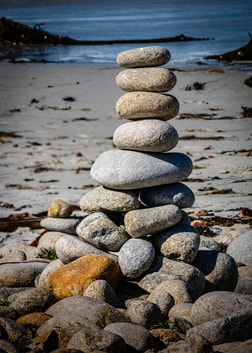God is Here
by Teri Daily

A sermon given on July 19, 2020, by the Rev. Teri Daily on Genesis 28…
You may download a pdf copy of the sermon here: Download
The major characters of our tradition are not always people we admire for their upright moral behavior. In fact, if Jacob or Moses or David were teachers, physicians, or even lawyers in this day and age, it’s safe to say that their certifications would be revoked on the grounds of moral turpitude – since murder, fraud, and adultery would probably fit that criteria. Maybe even some of the stories of our faith could be woven together, made into a DVD, and rightly named Biblical Boys Gone Wild. Let’s face it – we might admire the forerunners of our faith for the way God worked through them, but we wouldn’t want very many of them to date our daughters.
In today’s reading from Genesis, it’s Jacob who has our attention. Jacob was ruthless in taking advantage of his older brother Esau. You may remember that Jacob fixed a wonderful-smelling soup and had it ready for Esau when he came home from hunting, tired and famished and vulnerable. Jacob offered the soup to Esau on the spot, for the mere price of his birthright, that is – for all the extra property and material possessions that was due the eldest son. And Esau gave in, trading his inheritance for a bowl of soup.
As if that wasn’t bad enough, Jacob went on to deceive his father, committing fraud in today’s legal language. Jacob put lambskin on his arm so that his blind father Isaac would think he was speaking to the hairy Esau instead. Jacob tricked Isaac into giving him the blessing that should have belonged to Esau.
Not only was Jacob ruthless and deceptive, but he also had an enmeshed relationship with his mother. He had always been Rebecca’s favorite. It was Rebecca who helped Jacob trick his father. And when Esau threatened to kill Jacob, she came up with a plan to get Jacob out of town until Esau’s anger faded. She said to her husband (probably with the back of her hand across her forehead in melodramatic fashion): “If Jacob marries one of the Hittite women such as these, one of the women of the land, what good will my life be to me?” And so Isaac sends Jacob to Rebecca’s family, to take a wife from among his cousins.
Add to all this chaos the fact that Jacob doesn’t appear to be the most religious person around. While talking to his father in the previous chapter, Jacob refers to God as “your God.” In the long-standing biblical tradition of God acting through those we would deem least likely to be instruments of God, Jacob the scoundrel takes center stage in the story of our faith.
I wonder if it ever occurred to Jacob what he was giving up when he snatched Esau’s birthright out from under him, or when he gave in to his mother’s scheme to cheat his brother out of their father’s blessing. Leaving his family to travel to his uncle’s land, leaving behind his home and all that he knew, knowing that this was probably the last time he would see his parents. I can’t imagine how alone Jacob must have felt as he set out on his journey, or when he lay down to sleep that night using only a stone for a pillow.
All alone and vulnerable to the world around him, Jacob dreams of a ladder reaching up to heaven, with angels ascending and descending on it. God stands beside him, repeating the same promises God gave to his father and grandfather – I will give you land, I will give you offspring, I will be with you wherever you go, and I will be faithful in what I have promised. It makes perfect sense that Jacob would want to mark this particular place by a pillar with oil poured over it. Because no matter how messed up his life seemed, no matter how alone he felt, for a moment Jacob glimpsed a beautiful truth – that God was with him not merely for one mystical evening, but that God would be with him wherever he went, always.
I believe that’s the way sacred places and experiences work in our lives. They are the places and times where we glimpse a truth greater than any one moment or place – the truth that God is always with us, that heaven is always closer to us than our own breath, that God will not leave us but will accomplish in us God’s purpose. Sacred places are sacred because they reveal to us a truth that illuminates our whole lives – making all the times and places of our lives seem a little more sacred.
“Surely the Lord is in this place – and I did not know it!” exclaims Jacob. I don’t think it’s coincidental that this revelation comes to Jacob while he’s in transit, while he’s on the way to where he’s going. Too often we think God will be found at our destination, not in our current location. If I start praying the Daily Office like clockwork, then God will show up in my life….If I can find the perfect faith community, then God will seem real to me….If only I had the perfect spouse, a more reasonable job, or a more livable house, then I would feel blessed….If I could just find the right kind of prayer, enough time in my day, or become more spiritually adept, then I would see God. It seems that we’re always expecting to find God in what comes next in our lives and, like Jacob, we’re sometimes surprised when God shows up right where we are.
In Benedictine monasteries, monks take a vow of stability – a commitment to stay in a particular monastic community for life unless sent somewhere else by one’s superior. Now if there’s anything that seems contrary to the way today’s world works, it’s a vow of stability. The average American family moves every five years, and technology changes even faster than that. But the vow of stability conveys a deep, essential theological truth: God isn’t waiting for us in another town, or another job, or even with other people. God may call us to other places, but God is also always right where we are. That’s the promise that is at the root of the practice of stability. As Anthony Bloom, a monk and metropolitan bishop in the Russian Orthodox Church has written:
If you do not find [God] here it is useless to go and search for [God] elsewhere because it is not [God] who is absent from us, it is we who are absent from [God]…If you cannot find [God] here you will not find [God] anywhere else.[1]
This promise of God’s presence is something many of us need to hear during this pandemic – a time when we seem to be walking in place, making little progress, and yet even this place in which we are stuck can seem unfamiliar and unsafe. Surely God is even in this place – and I did not know it!
If you are like me, dreams of God speaking while angels ascend and descend a ladder to heaven are not a nightly occurrence, even during the unusual circumstances of a pandemic. It can be hard to see God’s presence in mundane routines. I recently came across an article that outlines five practices that may help one discern the presence of God in the ordinary moments of everyday life:

- Micro-awareness – Letting the smallest of actions be the primary purpose of any given moment – drying a dish, walking up stairs, taking a book from the shelf – can lead to a sense of holiness in each act.
- Journaling – Taking the time to write out thoughts and feelings.
- “The Old-Fashioned Way” – Take the time to do something the long way, such as handwriting a letter or walking to someone’s desk instead of texting or heating something on top of the stove instead of using the microwave. A slower pace may lead to more meaningful interactions and greater time to experience God’s presence.
- Listen – Wholeheartedly, without thinking of what you want to say or the million and one things still left to do.
- Say “God is here” – When you feel yourself unsettled by anger or worry or fear, say “God is here” out loud or to yourself. Does that transform the situation? Does God’s presence become palpable to you?[2]
Perhaps it would be a stretch to call Jacob a Benedictine or Ignatian prototype. But if Jacob recognized the presence of God while alone, running for his life, and sleeping on a rock, then we certainly can have hope to find God present in our own lives. Where in your life right now do you see God? Where are the places and moments where you find yourself exclaiming, like Jacob, “Surely the Lord is in this place”? Mark those times and places as sacred. Let them bear witness to the presence of God at all times and in every place.
[1] As quoted in Esther de Waal, Seeking God: The Way of St. Benedict (Collegeville, Minnesota: Liturgical Press, 2001) 65.
[2] Andy Otto, “Five Ways to Find God in All Things,” Ignatian Spirituality, https://www.ignatianspirituality.com/5-ways-to-find-god-in-all-things/#:~:text=%20Five%20Ways%20to%20Find%20God%20in%20All,can%20often%20close%20the%20door%20on…%20More%20, last accessed July 18, 2020.
